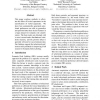Free Online Productivity Tools
i2Speak
i2Symbol
i2OCR
iTex2Img
iWeb2Print
iWeb2Shot
i2Type
iPdf2Split
iPdf2Merge
i2Bopomofo
i2Arabic
i2Style
i2Image
i2PDF
iLatex2Rtf
Sci2ools
ACL
2009
2009
Generalizing over Lexical Features: Selectional Preferences for Semantic Role Classification
This paper explores methods to alleviate the effect of lexical sparseness in the classification of verbal arguments. We show how automatically generated selectional preferences are able to generalize and perform better than lexical features in a large dataset for semantic role classification. The best results are obtained with a novel second-order distributional similarity measure, and the positive effect is specially relevant for out-of-domain data. Our findings suggest that selectional preferences have potential for improving a full system for Semantic Role Labeling.
ACL 2009 | Computational Linguistics | Selectional Preferences | Semantic Role | Semantic Role Classification |
| Added | 16 Feb 2011 |
| Updated | 16 Feb 2011 |
| Type | Journal |
| Year | 2009 |
| Where | ACL |
| Authors | Beñat Zapirain, Eneko Agirre, Lluís Màrquez |
Comments (0)

